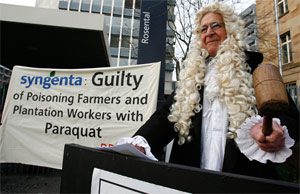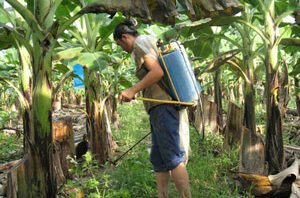An important victory and a disappointing setback came out of the global policy meetings I wrote about recently. The victory is a huge one: civil society leaders helped to secure a worldwide ban of the pesticide pentachlorophenol (PCP) under the Stockholm Convention.
In a dramatic twist, participating countries took the historic step of ‘voting to vote’ instead of trying to achieve consensus, as is the norm. The step was taken in response to a few countries’ aggressive efforts to thwart progress.
Not so successful were efforts to add the toxic herbicide paraquat to the Rotterdam Convention, so that the worldwide trade of this antiquated chemical would be better regulated.
PCP: Bad behavior & robust rebuttal
During the meeting, India shockingly rejected the findings of the Stockholm Convention’s own scientific expert committee, and in doing so blocked progress on listing PCP for a ban. PCP is a hazardous pesticide used extensively in the U.S. and around the world as a wood treatment.
Frustrated with this continuous opposition by India, other countries took an unprecedented step. Instead of working toward a decision by consensus, they decided to take a vote.
Switzerland triggered the historic voting. After voting to set aside the usual consensus procedure, 94 countries voted in favor of global ban of PCP, two opposed and eight abstained. Victory!
Longtime PAN partners from Alaska Community Action on Toxics (ACAT) were central to winning support for the PCP ban. The Indigenous Peoples of Alaska and other circumpolar regions face high levels of exposure to PCP because of the persistent chemical’s ability to be transported northwards by wind and water currents. ACAT’s Director Pamela Miller applauded the outcome of the meeting:
“We commend the global community for this important decision which will help ensure that Indigenous Peoples and the traditional foods on which they depend are protected against toxic pentachlorophenol and other industrial chemicals.”
Paraquat: A continuing challenge
When it was time to decide on the herbicide paraquat, opposition by India, Indonesia and Guatemala blocked the possibility of listing the chemical for stricter trade restrictions in this round of meetings. This was disappointing for PAN and our allies, who have been pressing hard for progress on this dangerous herbicide.
PAN India released a powerful new report documenting on-the-ground conditions and effects of paraquat use in India. Despite this strong evidence, the Indian delegation remained steadfast in their opposition to listing paraquat in the Rotterdam Convention.
Jayakumar Chelaton from PAN India highlighted the importance of action on this health-harming chemical:
“Paraquat dichloride is an acutely toxic chemical that is used under high risk conditions in developing countries. In India, its use poses great health risks to both farmers and workers.”
Government delegates who were in favor of listing paraquat took the floor to express concern that a handful of governments were using the consensus procedure to prevent other countries from their right to information on trade of such a highly hazardous chemical.
One strong critique of the roadblocking behavior was expressed by Dr. Paul Windinpsidi Savadogo from the Ministry of Environment and Sustainable Development of Burkina Faso:
“This is a missed opportunity, and it is regrettable that a few countries prevented the majority from being able to take measures to protect human health, particularly of farmers and agricultural workers, who are the most exposed.”
PAN and our allies remain committed to getting paraquat and other such hazardous pesticides on the Rotterdam “Prior Informed Consent” list — and out of the global agricultural production system. We’re in this for the long haul!







